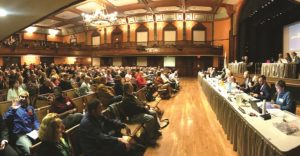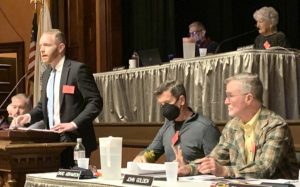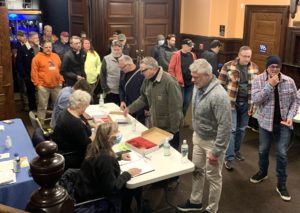This story, which initially ran on Nov. 11, has been updated for the Nov. 17 issue.
PROVINCETOWN — Voters at the Nov. 9 special town meeting endorsed a $75-million sewer expansion plan. The five articles that authorized the project all passed overwhelmingly, with about 300 “yes” votes and perhaps 20 “no” votes on the funding authorization in Article 5.
The $75 million will not come from property taxes but from $25 million in state and federal grants, $5 million in state paving funds and dedicated rooms tax revenue, and $45 million in “betterment” assessments on properties that will gain access to the sewer system. Because they did not involve a Proposition 2½ override or debt exclusion, the sewer articles do not require a second affirming vote at the ballot box.

The town meeting lasted about 90 minutes — unusually brief by local standards. The first four sewer articles drew few speakers to the microphones, and Moderator Mary-Jo Avellar brought them to relatively quick votes, which the assembled electorate seemed happy to provide.
The fifth sewer article, which authorized the relocation of post-treatment underground leaching fields to Motta Field, drew a bit more discussion but still passed with only about 10 “no” votes.
There were two unrelated articles at the beginning of the meeting: Article 1, involving an application for state funding for a lead-pipe inventory, and Article 2, authorizing a $1.75-million purchase of 1.9 acres for conservation. Both passed quickly. After open space committee Chair Dennis Minsky spoke about the land purchase and voters unanimously supported it, the room gave Minsky a warm round of applause.
With that work done, Town Manager Alex Morse took the microphone for a detailed slide presentation on the sewer expansion.
Provincetown is unusual on Cape Cod for even having a municipal sewer system — most Cape towns rely entirely on on-site septic systems for wastewater disposal. In 2000, town meeting voters authorized a vacuum sewer system to serve only the town’s commercial core. Subsequent sewer projects have added gravity lines that serve harborfront neighborhoods in the East End and West End as well as several neighborhoods near Shank Painter Pond.
The next step in the sewer expansion, phase 6A, would allow every property in the existing sewer districts to hook up to the system by 2026, Morse told voters. Phase 6B would expand the sewer system into new neighborhoods, including Conwell Street, Harry Kemp Way, Nelson Avenue, and Winslow Street, and would take place between 2026 and 2030. By the end of this decade, every property in town should have access to a municipal sewer line, Morse said.
The town’s original approach to sewering had been to connect its large commercial users but to leave most res

idences alone, according to the town’s longtime sewer consultant John Goodrich. But with major changes expected at the state level to Title 5 rules governing septic systems, the town’s staff and sewer engineers became convinced that on-site systems are not the future in Provincetown.
“Current Title 5 requirements and proposed changes will require larger tanks, more disposal area, greater depth to the water table, and may require expensive denitrification systems,” Morse said. Costs to homeowners will likely rise as the state tightens its wastewater rules.
Other towns will be looking to add sewer systems soon, Morse said, but because Provincetown already has one in place, it could move quickly to seek funding for an expansion. Waiting until subsequent town meetings would run the risk of other larger jurisdictions soaking up much of the available money, Morse warned.
Morse also emphasized that the new expansion plan allows homeowners some ability to opt out of a sewer connection. The owners of properties with significant logistical obstacles to sewering can apply to the board of health for permission to install an up-to-code septic system between now and 2026, Morse said. As long as that system continues to pass board of health inspections, it could potentially function for decades, removing the need for the property owner to install a sewer connection.

Provincetown has an unusual land use history and some very oddly shaped lots, so for property owners whose homes are far removed from the town’s roadways the option to install a new septic system could be an important one.
By the end of Morse’s presentation, there were remarkably few questions from the audience. Two homeowners rose to challenge the location of a wastewater treatment substation on the town’s soccer field along Route 6, saying it would be less than 1,000 feet from their homes and would almost certainly create noxious odors on their properties. One warned that litigation on various grounds could follow if the substation produced more smells than the town’s engineers predicted.
After the two voters spoke, however, no one else rose to the microphone. Avellar called for a vote, and the show of hands was overwhelming. No serious objections were raised for the rest of the meeting.
The discussion of Motta Field included an amendment from school board member Ngina Lythcott to insert the word “post-treatment” into the article that authorized the installation of wastewater leaching fields under the field. That is exactly what the town’s sewer engineers had intended, and Morse and other staff voted for the amendment. After a bit more discussion, select board member John Golden called the question, and the vote for the final sewer measure was about 300 to 10.
The planning board asked to withdraw the last article, a change to the inclusionary bylaw that it had decided needed rethinking, and with that, the meeting was over. Town staff celebrated the remarkably smooth meeting, and the auditorium was empty by 8 p.m.



